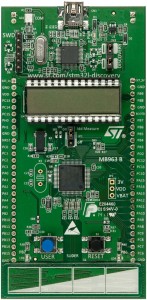I recall burning three or four weeks of a sabbatical getting Saccade.com on the air with Wordpress. So much tweaking…
STM32L-Discovery: What should I build with it?
 I got one of these boards the other day for free:
I got one of these boards the other day for free:
STM32L-DISCOVERY – STMicroelectronics.
Even if you didn’t get one for free, they seem to be pretty cheap: Nu Horizons has ’em for around $15, Mouser has them for $11.67, which makes them pretty much cheaper than every Arduino you can order. But what do you get for your dollars?
- 32 bit processor with 128K flash, 16KB of RAM, 4KB EEPROM
- DIP28 LCD Display
- Linear touch sensor
- Two user programmable LEDS
- Can use either 5v or 3.3v supply, including power supplied by USB
Examining the information about the processor, the STM32L152RBT6, it appears to be based on the ARM Cortex M3, with a maximum clock rate of 32Mhz. The processor is optimized for very low power consumption, it only consumes 9 microamps of current at 32kHz in low power mode, and 230 microamps?Mhz in “dynamic run mode”. That sounds pretty cool! It’s data sheet says that it has 10 timers, up to 8 communication interfaces (including a full speed USB 2.0 interface) and a 12 bit ADC. From the data sheet:
A 12-bit analog-to-digital converters is embedded into STM32L15xxx devices with up to 24 external channels, performing conversions in single-shot or scan mode. In scan mode, automatic conversion is performed on a selected group of analog inputs. The ADC can be served by the DMA controller. An analog watchdog feature allows very precise monitoring of the converted voltage of one, some or all selected channels. An interrupt is generated when the converted voltage is outside the programmed thresholds.
The events generated by the general-purpose timers (TIMx) can be internally connected to the ADC start trigger and injection trigger, to allow the application to synchronize A/D conversions and timers.
The ADC includes a specific low power mode. The converter is able to operate at maximum speed even if the CPU is operating at a very low frequency and has an auto-shutdown function. The ADC’s runtime and analog front-end current consumption are thus minimized whatever the MCU operating mode.
All that sounds pretty cool!
Anybody have any good ideas of something I can do with it? Go ahead and leave a comment, or hit me via Twitter (@brainwagon) with your suggestions.
Comments
Comment from Fred Hillhouse
Time 4/3/2012 at 6:30 am
A interface between a mobile HF-VHF-UHF radio (FT857D comes to mind) to read the frequency currently in use and send via KISS to an APRS client (APRSIS32 comes to mind).
The purpose is to let others around you know the frequency in use via the APRS frequency. The Kenwood TM-D710 and Yaesu FTM-350 will do this.
Timing would be something like once every 2-5 minutes or on a change.
It could also control the frequency, tone and mode if they apply.
Best regards,
Fred, N7FMH
Comment from Mike Burr
Time 11/7/2011 at 11:34 pm
work in concert with John Schuch and do a transmitter receiver pair, that converts text to audio. Transmit the audio back and forth using the internet. 🙂 makes use of the ADC and also the computing power, along with DMA inputs for keyboard input.